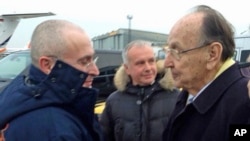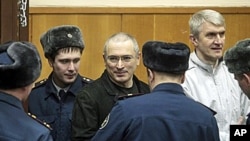Russian oil tycoon Mikhail Khodorkovsky arrived in Berlin on Friday after being released from prison. He left Russia just hours after President Vladimir Putin signed a pardon for him - ending more than 10 years of detention for tax evasion and embezzlement.
The former Yukos oil company head - viewed by many as a political prisoner - was greeted by former German foreign minister Hans-Dietrich Genscher at Berlin's Schoenefeld airport.
In a statement following his release Friday, Khodorkovsky said he asked the Russian president on November 12 to pardon him in connection with "family circumstances" and that he was "glad" the response was positive.
"The issue of admission of guilt was not raised," Khodorkovsky said in the statement.
Russia's federal prison service said Friday that Khodorkovsky had sought permission to travel to Germany, where his mother had been receiving medical treatment.
Putin said earlier Friday on his website that he was pardoning the longtime Kremlin critic for humanitarian reasons.
The White House welcomed the pardon, calling it a "humanitarian gesture" and "a positive development for Russian society." But National Security Council spokeswoman Caitlin Hayden also voiced concern about what she described as "politically motivated investigations and selective prosecutions in Russia."
Putin first announced his intention to free Khodorkovsky during a lengthy news conference Thursday that covered a wide range of topics. At that time, he said Khodorkovsky had, for the first time, requested a pardon because his mother is ill.
Putin also said two members of the Pussy Riot punk rock band will be freed on amnesty.
His announcements come ahead of Russia hosting the Winter Olympic Games in Sochi in February. The lead-up to the event has put Russia's human rights record in the spotlight.
The former Yukos oil company head - viewed by many as a political prisoner - was greeted by former German foreign minister Hans-Dietrich Genscher at Berlin's Schoenefeld airport.
In a statement following his release Friday, Khodorkovsky said he asked the Russian president on November 12 to pardon him in connection with "family circumstances" and that he was "glad" the response was positive.
"The issue of admission of guilt was not raised," Khodorkovsky said in the statement.
Russia's federal prison service said Friday that Khodorkovsky had sought permission to travel to Germany, where his mother had been receiving medical treatment.
Putin said earlier Friday on his website that he was pardoning the longtime Kremlin critic for humanitarian reasons.
The White House welcomed the pardon, calling it a "humanitarian gesture" and "a positive development for Russian society." But National Security Council spokeswoman Caitlin Hayden also voiced concern about what she described as "politically motivated investigations and selective prosecutions in Russia."
Putin first announced his intention to free Khodorkovsky during a lengthy news conference Thursday that covered a wide range of topics. At that time, he said Khodorkovsky had, for the first time, requested a pardon because his mother is ill.
Putin also said two members of the Pussy Riot punk rock band will be freed on amnesty.
His announcements come ahead of Russia hosting the Winter Olympic Games in Sochi in February. The lead-up to the event has put Russia's human rights record in the spotlight.






